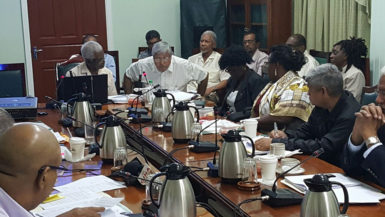With the Guyana Sugar Corporation (GuySuCo) saddled with a $77B debt and defaulting on all of its repayment obligations, it makes no business sense to keep it going, its Chairman Dr Clive Thomas told the National Assembly’s Economic Services Committee (ESC) yesterday.
His stark statement will be seen as a further sign that drastic decisions, including the closure or sale of estates in the beleaguered industry, is imminent.

With the Wales estate no longer growing cane as of the end of 2016 and the government still to come up with a concrete plan for the industry and thousands of workers, the ESC convened a hearing with GuySuCo at the National Assembly.
Chief Executive Officer (CEO) of GuySuCo, Errol Hanoman said GuySuCo’s debt amounts to $77B and that the way the industry is currently structured, it cannot be sustained. He pointed out that there would be need for some $18.9B in aid from the state this year and that figure is expected to climb in the coming years.
The CEO said that in 2014, the industry suffered losses of $17.5B, while in 2015 the losses amounted to $18.1B and in 2016 it was $12.1B, while the average loss for 2017 is expected to be $13.7B.
But of even greater concern, he said, is the question of the state subvention, which was $4B in 2012, $5.4B in 2013, $6B in 2014, $12B in 2015 and $11B in 2016 and if there is no change in the structure, the subsidy could be about $18.6B this year.
The level of subsidisation does not take into consideration the servicing of debts. Over the years, GuySuCo has been using creditors to finance its operations and they have not honoured those debts as well.
Dr Thomas told the committee that GuySuCo is awaiting guidance from the government on its decisions regarding the industry. A meeting was recently convened by the government with the opposition and the sugar unions, GAWU and NAACIE, on the way forward.
The Chairman stated that from the year 2000, 1.2 million man days were lost and that the employment cost exceeds the revenue from selling sugar.
GuySuCo has also not been paying the National Insurance Scheme, which is owed $1.7B, the Guyana Revenue Authority, which is owed $7.6B, the Guyana Lands and Surveys, the Local Authorities, the Guyana Agricultural & General Workers Union (GAWU) [$226M ], pension funds ($665M), the Caribbean Development Bank (CDB) ($829M) and for the Skeldon estate ($29.3B) and foreign creditors ($1B).
He pointed out that on every front, GuySuCo has been defaulting in its obligations to service its debts. Among the other expenses, he said,
employment costs in 2015 amounted to 101 percent of total revenue.
According to him, two ways of controlling costs are by getting productivity up and reducing head count. He told the committee that mechanisation is a key part of GuySuCo’s programme but there is a long way to go to come up with the right system. He noted that it is capital and skill-intensive and that it would be subject to weather and soil type. He said too that for too long they have kept the good estates down by keeping the poor performing estates going.
He spoke about the deterioration of the punts that are used to transport the canes as well as the bridges in the fields, dams, drainage and pumps. Because of the current state of GuySuCo, it would still require bailouts of $10B per year and would be making losses in excess of $10B per year.
Opposition People’s Progressive Party/Civic (PPP/C) Member of Parliament Juan Edghill said,
“There was a CDB loan for us to move in the direction of mechanisation and opening up new lands… Have we seen any change in terms of the cost of production if we go towards mechanisation?”
In response, Hanoman said they “did not pursue the CDB loan because we felt that conditions at Uitvlugt [Estate] are not so well and were we to go ahead with that loan we would end up having equipment coming in sitting idle and debts to service.” About 70 percent of that loan was intended for Uitvlugt.
Edghill also asked about some of the measures to get the cost of production down in order to make sugar profitable. Dr Thomas said a lot can be done but most importantly it should be the selection of estates that they should focus on. He is of the view that if the industry were a private business, it would have been closed down about 10 years ago, saying that “it makes no business sense to keep GuySuCo going….”
Minister of Foreign Affairs Carl Greenidge, in response to questions, said that decisions have to be taken about restructuring, and that it has to do with “how it is to be funded and how the product mix is to change over the years.”
He noted too that while each one has its consequences, the main thing that government is trying to avoid is the “collapse of the industry; not to generate new social problems.”
The meeting was facilitated by chairman of the ESC Irfaan Ali and while he was posing questions, Minister within the Ministry of Natural Resources Simona Broomes ‘sucked’ her teeth. When Ali, as chairman inquired who did it, she answered that it was her and he reprimanded her. Broomes then retorted that Ali was not her father.





